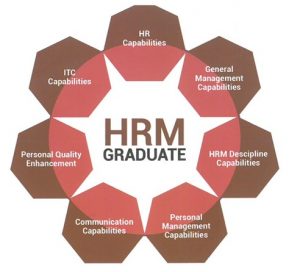Objectives
HRM is one of the most important functional fields of business administration and is a discipline that gives a competitive advantage to the University. The Degree programme has been named B.Sc. Human Resource Management (Special). The term ‘special’ means a four-year degree denoting the duration. Also it means ‘a degree with independent study/research and practical training’. The degree provides a general understanding of organizational management, competencies in communication, quantitative reasoning and information technology and then increasing specialization in HRM commencing from the second year up to the fnal year. The seven outcomes or goals of the degree programme are to develop:
- A graduate who will become a good citizen of Sri Lanka.
- A graduate who values excellence, productivity, integrity, expertise and job and business performance.
- A graduate who has the potential to become an effective and efficient professional in the field of human resource management.
- A graduate who is a person of good character.
- A graduate who can make a significant and unique contribution to human and institutional development in Sri Lanka.
- A graduate who has a passion as well as a mental and physical preparedness for continuous learning and self –
development. - A graduate who is special, giving from his/her heart, making the world a better place for those whose lives he/she touches.
Graduate Profile
On successful completion of the Degree BSc Human Resource Management (Special), graduates should be able to acquire knowledge, skills, and attitudes addressing seven broad domains of capabilities which are
(1) HRM Discipline Capability
(2) General Management Capability
(3) Human Relations Capability
(4) Information Technology Capability
(5) Communication Capability
(6) Personal Management Capability, and
(7) Personal Quality Enhancement Capability
The Department of HRM of USJ considers the above mentioned seven capabilities to be attainable by graduates in HRM. A Human Resource Management Graduate will have the following attributes, or knowledge, skills and attitudes (these are the set of attributes the department of HRM of USJ seeks and endeavours to impart to, or foster in, its graduates):
- Knowledge (USJ HRM GRADUATES KNOW. THEY)
- Demonstrate generalized knowledge of various functions of HRM.
- Demonstrate specialized understanding of core fields of HRM such as employment planning, staffing, human resource development, rewards management, and employee and labour relations.
- Have knowledge of various soft aspects of HRM including human relations, and psychological thinking, theory and practice.
- Possess knowledge of contemporary, international, and sustainable aspects of HRM.
- Have an adequate knowledge of general aspects of managing an organization, and other functional fields of organizational management.
- Demonstrate know-how of followership and leadership through proper communication, information technology and interpersonal dealings.
- Possess knowledge of morality enhancement, ethical and social performance, and self-management.
- Skills (USJ HRM GRADUATES DO. THEY)
- Apply fundamental concepts and principles of HRM in solving cases and critical incidents.
- Develop practical schemes or programmes (which include appropriate policies, procedures, rules etc.) in solving traditional and non-traditional issues in HRM.
- Originate reviews, evaluations or audits of actual HRM practices and propose remedial actions and initiatives to enhance the practice of HRM in organizational settings..
- Perform a systematic, and/ or scientific investigation into a HRM phenomenon so as to solve an existing problem, or enhancing the existing level of that phenomenon, or provide useful information to enhance the quality level of practice.
- Evaluate the legal, social, economic and other environments and apply knowledge of business functions in an appropriate manner and an integrated manner in organizational settings.
- Apply knowledge of communication, IT, and interpersonal dealings to work effectively in teams, in followership, and in leading.
- Perform gap analyses in order to identify weaknesses or areas of improvement, learning with regard to identified weaknesses or areas of improvement, and reviews for progress of building critical observable behaviours, in particular with regard to personal quality enhancement, personality development and self management.
- Attitudes (USJ HRM GRADUATES BELIEVE, FEEL, AND TEND TO BEHAVE. THEY):
- Believe that institutional development and human development heavily depend on HRM.
- Believe that all the problems of organizations can at least partially be solved by sound HRM.
- Demonstrate appreciation for human resources as the most important resource an organization has when compared with all other resources.
- Show intention to become a person who is capable, motivated and committed to work in managing human resources.
- Believe that it is possible to lead a very successful life by working in the field of HRM, and or Management.
- Show behavioural tendency to become a successful follower and a successful leader.
- Exhibit a strong feeling interestingly and positively with regard to becoming a person of morality, ethics and responsibility.
